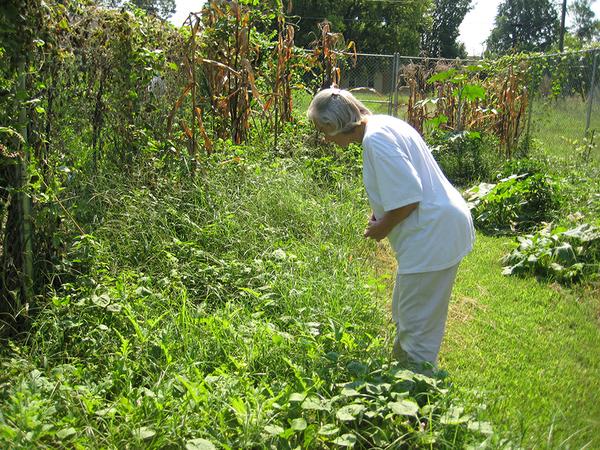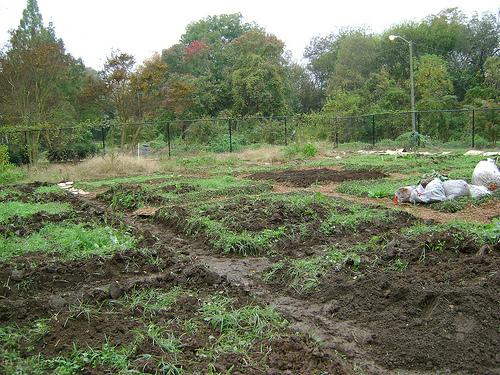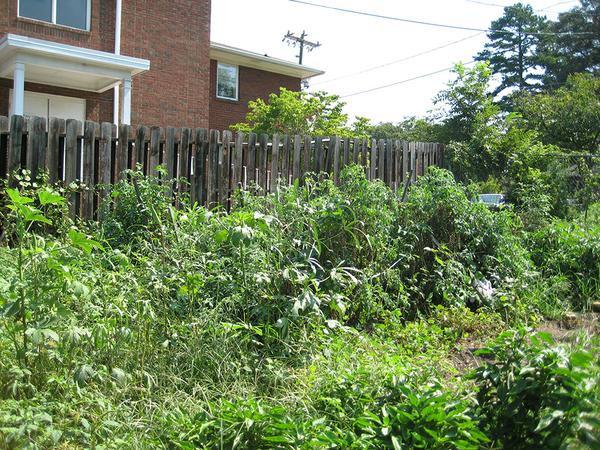This chapter discusses common challenges facing community food gardens in North Carolina and some proven strategies for meeting them. A well-organized garden with strong leadership and committed members can overcome almost any obstacle.
Abandoned or Neglected Plots
Abandoned and neglected plots are eyesores. They may become littered with rotting produce and harbor pests, diseases, and weeds.
- In the garden’s letter of agreement, include a “you harvest when ripe, or we will harvest it for you and donate it” clause. This clause should state that gardeners will lose neglected plots and that the garden can mow down and clean up any neglected plot and reassign it as part of a clear, fair process.
- Make it clear that dues will be forfeited in the case of abandoned or neglected plots.
- Make sure that the garden has reliable contact information for all gardeners. Contact gardeners with messy plots to find out if they need help due to health or personal problems, and try to work with them.
- When a gardener leaves, reassign the plot to a new, active gardener as soon as possible; be sure the garden’s wait list is current and accurate.
- Encourage and support gardeners who have good-looking plots by holding a plot of the month contest and award.
- As a temporary measure to address unkempt plots, consider planting a cover crop or using the plot for a large shared group crop, such as corn or melons.
Complaints from Neighbors
Angry neighbors complaining publicly about weedy gardens or rowdy behavior can give community gardens a bad name. Community gardens should strengthen community, not cause problems.
- Set up a strong maintenance committee to prevent weeds and keep the garden looking good.
- Enforce abandoned and neglected plot rules.
- Build a positive relationship with people who live near the garden and meet with them in person to acknowledge their concerns. Offer concrete steps to address problems.
- Discourage loitering in and around the garden. If the problem is youth with no place to go, help create ways to solve this problem.
- Remind gardeners to respect neighbors by avoiding loud conversations, loud music, and noisy garden equipment, particularly at quiet times of day. Be thoughtful about parking.
- Be generous and share flowers and fresh vegetables with neighbors.
- Recruit neighborhood leaders as gardeners and community garden supporters.
Feuding Gardeners
Disputes between gardeners can poison the atmosphere in a community garden and distract the group from important tasks.
- Model respectful, courteous, and peaceful relations in the garden.
- Plainly state in the guidelines that violence, including yelling and insults, has no place in the garden.
- Design the garden to minimize problems. Consider setting aside part of or the entire garden as organic (group gardeners with similar perspectives on pesticides in the same area).
- Be fair and transparent about assigning plots and managing the wait list.
- Carefully supervise children and create special places in the garden for them.
- Act quickly to resolve potential problems; don’t let issues fester unresolved.
- Seek ways to mediate disputes.
- If the garden has a troublemaker who thrives on conflict, encourage that person to take a break from confrontational behavior while in the community garden.
- Keep a sense of humor and practice compassion at all times.
Fire Ants
Fire ants have a painful sting and can be a dangerous garden nuisance.
- Educate gardeners about fire ants so they know what they are dealing with.
- Teach gardeners how to deal with stings and how to dress to prevent ants from getting onto their skin.
- Mark mounds with irrigation flags and treat them promptly.
- Teach gardeners effective techniques to control fire ants in their plots, such as the Texas Two-Step (available in both organic and chemical versions).
- Monitor fire ants carefully, and be prepared to treat the entire garden using an effective technique at the optimum time, based on recommendations from NC State Extension. Be aware, however, that the best sustainable control for exotic fire ants is a healthy local ant population, which can be decimated by blanket application of ant control chemicals.
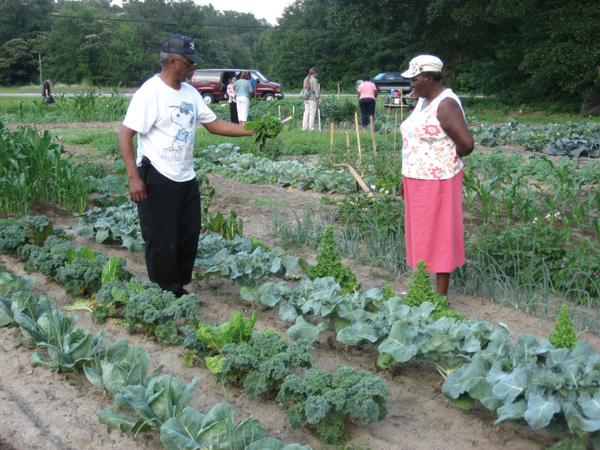
Lisa Valdivia CC BY-NC 4.0
Poor Soil or No Soil
Poor soil, or a complete lack of topsoil in some urban sites, can make productive vegetable growing impossible.
- Construct raised planters and fill them with the most environmentally friendly and economical mix suitable for growing vegetables.
- Garden in pots or large containers in locations where soil is unworkable.
- If the soil is hard but potentially workable, or covered with bermudagrass or an established lawn, try using pillow packs or grow bags of soil and compost placed atop cardboard and woodchip mulch.
- Consider alternative sites for the garden, and use the problem site for a different project, such as a community greenhouse or a youth sports field.
Super Gardeners
Sometimes a single individual in a community garden may make most of the decisions (as well as do much of the work). In community garden circles, these people are sometimes called super gardeners. A garden can depend so heavily on its superg ardener that it fails when that person leaves.
- Help super gardeners and other natural leaders learn to share responsibility, delegate authority, and empower others to make decisions.
- Pro-actively recognize and respect a super gardener’s hard work and many contributions, especially when she or he is an original founder of the garden.
- Offer opportunities for this person to become a mentor to pass along knowledge and experience to other gardeners.
- Build democratic processes into garden management, and work to ensure that consensus means all voices are heard and, when possible, reflected in decisions, even when the super gardener disagrees.
- Create fair and thoughtful rules and governing structure, including term limits, and apply them fairly to everyone involved in the garden.
Theft
Loss of ripe vegetables, flowers, tools, benches, and other items from the garden is extremely demoralizing. Theft can come from both inside and outside the garden.
- Require gardeners to harvest in a timely manner and not leave ripe produce sitting unharvested for long periods.
- Make sure guidelines and the letter of agreement clearly state that gardeners are not to harvest from other plots without permission.
- Establish good relations with the neighborhood; ask the garden’s closest neighbors to keep an eye on things. Make friends with local law enforcement, youth, and seniors.
- Consider enclosing the garden with a gated fence, but realize that this will not be sufficient to discourage serious thieves or malicious vandals.
- Hold classes and other events in the garden, and invite the neighbors so they know that it is their garden too.
- Set up a "you-pick" garden outside the fence or at the edge of the garden for passers-by, and place a basket outside the gate to share surplus vegetables donated by gardeners to whoever needs them.
- Put up signs stating that only gardeners may pick produce, and that the public is not free to help themselves.
- Along the edge of the garden, grow root crops, such as potatoes, that are not attractive targets for theft. Choose unusual varieties (for instance, black tomatoes or red lettuce).
- Secure garden furniture with cables, or use biodegradable materials such as hay bales, for benches and tables.
- Paint garden tool handles with bright colors.
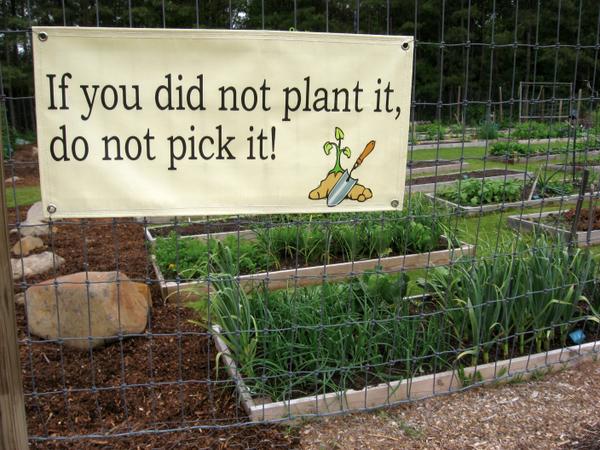
Lisa Valdivia CC BY-NC 4.0
Vandalism
Vandalism, when someone tramples vegetable beds and destroys or defaces property, is both frightening to gardeners and terribly discouraging.
- Reach out to the community and particularly local youth, as suggested for preventing theft. Arrange for police to drive by the garden regularly, especially in the evenings.
- Keep the garden clean and neat looking, and keep lines of sight open.
- Make sure boundaries are clearly defined. A fence and gates are more effective for deterring casual vandalism than they are for controlling theft.
- Maintain your perspective. Don’t treat damage from an awkward gardener or careless child as vandalism. After an incident of true vandalism, take a deep breath, and act quickly to repair the damage and restore the garden’s appearance.
Weeds
Uncontrolled, rampant weeds can make even a productive garden look very unappealing.
- Know your enemy—get help and research-based information on weed control from NC State Extension.
- Form a strong and active maintenance committee.
- In the guidelines and letter of agreement, specify weed management requirements for personal plots and community areas.
- Don’t make the garden larger than the group can manage, especially in the beginning. Make sure all plots are assigned to an active gardener throughout the growing season. Act promptly to deal with any abandoned or neglected plots.
- Encourage the use of mulch around plants to suppress weeds.
- Intervene early: the smaller the weed, the easier it is to remove. Remove weeds before they flower and set seed to prevent the next generation.
- Schedule workdays at times when weed problems are expected, such as in March (cool-season weeds) and August (warm-season weeds).
- Keep a watchful eye on the fence line, composting, and bulk storage areas, and take quick action to stay ahead of weed growth.
- If gardeners and volunteers can’t handle weed control, hire appropriate help.
Weeds—Bermudagrass
Bermudagrass is sometimes used for lawns and sports fields because it grows fast and is difficult to kill. These characteristics make it a problem in community gardens, where it can strangle crops and take over.
- Learn to identify bermudagrass, both during the growth and dormant phases. Act quickly to deal with bermudagrass before the garden is established on a site.
- For organic control, mow very close, then smother with cardboard and deep mulch (six inches), and do not water through the entire growing season. Quickly remove any sprigs that emerge through the mulch or spread by underground stems to prevent them from photosynthesizing and producing food for the plant.
- During the dormant season (cold weather), bermudagrass turns brown. Try carefully digging out the underground stems. This control method is very labor intensive and will only work for small areas or with a very large number of dedicated people to weed.
- For chemical control, use an herbicide labeled for use around edible crops. Contact your local Extension agent for recommendations, follow instructions on the label exactly, and only use during the active growing season (summer).
Publication date: Aug. 10, 2017
AG-806
Other Publications in Collard Greens and Common Ground: A North Carolina Community Food Gardening Handbook
N.C. Cooperative Extension prohibits discrimination and harassment regardless of age, color, disability, family and marital status, gender identity, national origin, political beliefs, race, religion, sex (including pregnancy), sexual orientation and veteran status.

